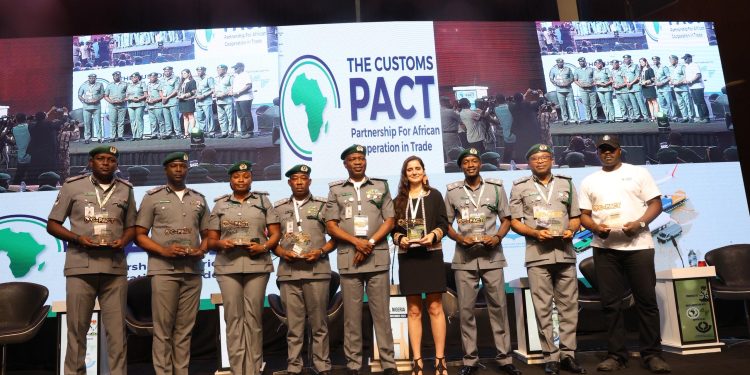By Nkechi Eze
The Nigeria Customs Service has rounded off its maiden Customs Partnership for African Cooperation in Trade (C-PACT) Summit, closing three days of high-level deliberations in Abuja with a renewed continental commitment to dismantling non-tariff barriers and strengthening cooperation under the African Continental Free Trade Area (AfCFTA).
The closing ceremony, held at the Congress Hall of the Transcorp Hilton on 19 November 2025, brought an energetic finish to a summit that convened Customs chiefs, policy strategists, industry experts and private-sector players from across Africa. Hosted by the Comptroller-General of Customs, Adewale Adeniyi, the engagement featured technical sessions, policy exchanges and thematic discussions designed to advance harmonised border procedures across the continent.
In his remarks, Comptroller-General Adeniyi described the summit as a turning point for African Customs collaboration, noting that the C-PACT platform had enabled countries to “move from fragmented efforts to collective solutions.” He emphasised that the resolutions reached would guide Customs services in tightening compliance systems, modernising operations and reducing long-standing procedural hurdles that continue to slow cross-border trade.
Adeniyi added that the C-PACT initiative conceptualised and championed by Nigeria would now evolve into a permanent engagement mechanism for African Customs administrations to share experiences, exchange data, and harmonise processes in line with AfCFTA ambitions.
The summit drew strong political and institutional endorsements. Vice President Kashim Shettima, who declared the event open on behalf of President Bola Tinubu, had urged African nations to confront deep-seated structural barriers to trade and adopt a unified framework that supports industrial expansion, competitiveness and predictable commercial flows across borders.
The Secretary-General of the World Customs Organisation, Ian Saunders, reminded delegates that Customs institutions remain at the heart of AfCFTA’s success because they “connect borders, enforce standards and determine the practical realities of trade,” while the Executive Vice President of Afreximbank, Kanayo Awani, stressed that without interoperable and technology-driven Customs systems, the economic promise of AfCFTA would be difficult to realise.
Participants expressed satisfaction with the depth and intensity of the conversations, particularly on rules of origin, digital documentation, transit regimes, risk management, gender inclusion and coordinated border management. Delegates also agreed that C-PACT should continue as a specialised technical body for monitoring progress, reviewing best practices and aligning national systems with emerging continental standards.
Private-sector actors—including manufacturers, exporters, freight operators, logistics firms and port administrators—provided frank assessments of the barriers still affecting intra-African trade. They highlighted inconsistent documentation requirements, procedural delays and administrative bottlenecks that undermine commercial confidence across the region.
The National President of the Association of Licensed Customs Agents, Emenike Kingsley, described the summit as the first platform in years where Customs managers and economic operators could jointly dissect operational constraints and propose workable reforms.
With the conclusion of the maiden edition of C-PACT, stakeholders left Abuja with a shared resolve to build a more predictable, technology-driven, and collaborative Customs ecosystem capable of unlocking the full benefits of AfCFTA and accelerating economic integration across the continent.

















